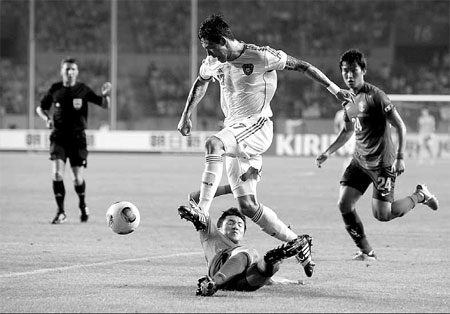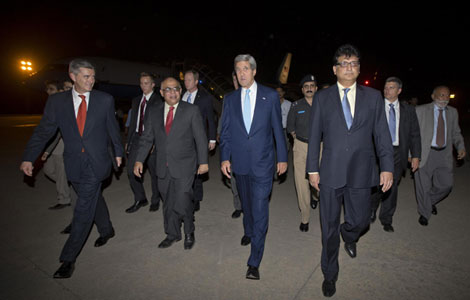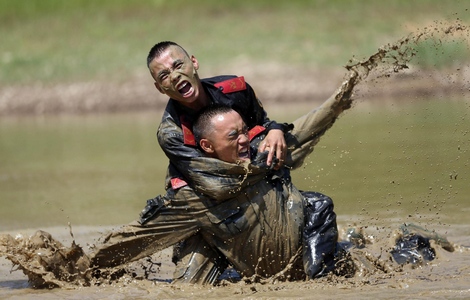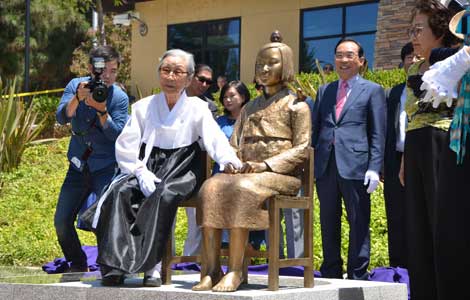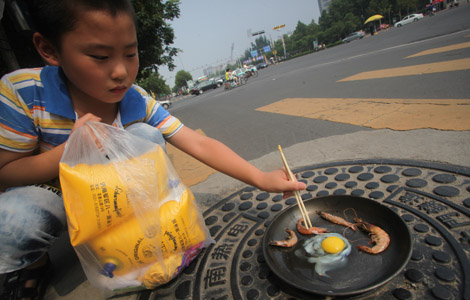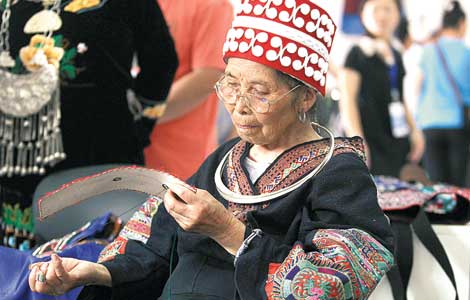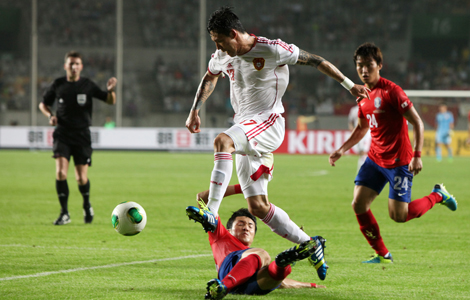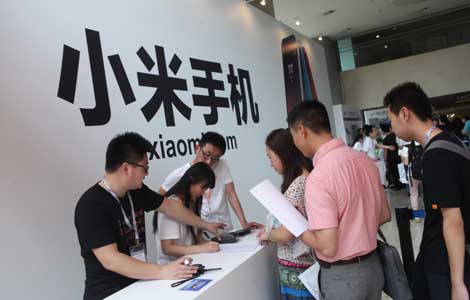Soccer strives for elusive success
Updated: 2013-08-01 07:43
By Tang Zhe and Lei Lei (China Daily)
|
||||||||
|
Chinese defender Zhang Linpeng evades a tackle from a South Korean player during an East Asian Cup game on July 24, which ended in a goalless draw. The team's performance at the cup brought relief to soccer fans after a humiliating defeat to Thailand in June. Park Jin-Hee / Xinhua |
Stories about bribery and match-fixing scandals may have disappeared from the front pages, but 2013 has so far been another frustrating year for Chinese soccer fans.
These past seven months have seen the national team eliminated from qualifying for the 2014 World Cup, slipping out of the top 100 in FIFA's rankings, and losing 5-1 to a young Thailand team.
And for former head coach Bora Milutinovic, results are unlikely to improve unless the country focuses more on youth development.
"When people talk about the national team, they should be aware that the future of the team depends on how young players are brought through," said the Serbian veteran, who led the Chinese team to its first and only World Cup finals, in South Korea and Japan in 2002.
"I worked in the United States when soccer was starting to be encouraged among children," he said. "Do you know how many young players aged 10 to 17 are registered in Southern California alone? It's 150,000. How many are there in China?"
The Chinese Football Association was unable to provide specific data on youth players, yet according to its figures from 2011, China only had about 8,000 registered players of all ages.
Two draws and one win at the East Asian Cup last week did bring some relief to soccer fans.
The national team finished second in the four-team tournament, drawing 3-3 with Japan and 0-0 with South Korea, and recording a morale-boosting 4-3 result against Australia.
However, few will be heralding the performances as a new dawn, especially as opposing teams all fielded lineups of mostly reserve and youth players.
Many problems still need to be solved before China can ever dream of being a force at international tournaments. The most obvious are China's relatively small population of players and its league system.
Japan set a great model for its Asian counterparts by building a pyramid system, channeling primary school leagues to university leagues, and then into professional divisions.
After using the system for several years, the Japanese women's national team went on to become 2011 World Cup winners, and its men's and youth teams are also competitive challengers at international level.
By comparison, China's league structure, which has just two 16-team professional leagues and an amateur league with an ever-changing number of teams, failed to produce a sustained flow of talent.
Former China striker Hao Haidong says the country's attempts to reform its State-run league system into a market-driven product, which began in 1994, have been inadequate.
Deferred salaries are not rare for players from teams in the second and third tiers, the 43-year-old said.
"As opposed to soccer in developed countries, where playing for a professional club means a secure living, certain Chinese players are not properly paid and don't even have insurance," he said, explaining why some Chinese parents are reluctant to let their children play "the beautiful game".
Operational difficulties, as well as match-fixing scandals in recent years that involved several well-known players and CFA officials, have also not helped promote the sport, Hao said.
Moreover, he said, small clubs are incapable of organizing youth teams, since renting stadiums and training bases, and salary costs already have them stretched.
Modern way
Milutinovic suggested the way forward is for China to continue learning from the outside world.
"To motivate and create passion among teenagers and young adults, you need to train them in a more modern way," he said. "This is why clubs and federations need to send coaches to travel and study different techniques."
China's new leadership has shown a strong interest in developing soccer.
Delegates made up of officials from the State Council; the National Development and Reform Commission, the top economic planner; the ministries of education, finance and public security; and the General Administration of Sport were recently involved in fact-finding mission to Japan.
The Ministry of Education has also started to cooperate with the CFA to promote soccer in schools, while Chinese news website Sina reported that more policies will be introduced to develop the domestic game, such as tax breaks for companies investing in soccer and stadiums.
Dalian Wanda's multimillion-dollar sponsorship deal with Chinese soccer was also brokered through negotiations at a national level.
However, concerns remain that the government may still have too much involvement in decision-making. Instead of being an independent organization, the CFA is an administrative department under the General Administration of Sport.
Wang Dazhao, a veteran soccer reporter for People's Daily, said higher administrations are taking care of too many decisions for the CFA, including the appointment and firing of former national team coach, Jose Antonio Camacho.
"Regarding CFA's limited power, it is only an executor of a higher order in the Camacho affair," he said. "It was much better 20 years ago, when no official interfered in the association's decision.
"The CFA always takes the blame for the decisions, but most of the public don't know the truth," he added. "If the CFA can't even decide the national team's head coach, the situation will never improve."
Contact the writers at tangzhe@chinadaily.com.cn and leilei@chinadaily.com.cn
(China Daily USA 08/01/2013 page5)
Most Viewed
Editor's Picks

|

|

|

|

|

|
Today's Top News
7.5% GDP growth 'in reach' this year
Surveillance plan files declassified
Xi vows to protect maritime interests
Snowden's father thankful to Putin
UN to probe alleged Syria chemical attacks
Saudi blogger faces lashes for 'insulting Islam'
Memorial a tribute to WWII 'comfort women'
Hollywood unpaid for movies
US Weekly

|

|
